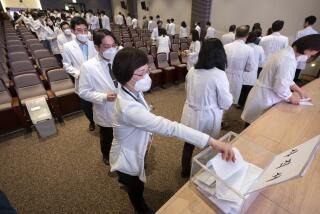Medicine’s Appeal to Internists Fades : Health: A survey finds that specialists in the field are increasingly dissatisfied with long hours, bureaucracies and relatively low pay.
- Share via
Internal medicine specialists, who provide the majority of care for the elderly and adults with complex illnesses such as AIDS and diabetes, are becoming increasingly dissatisfied with their profession, according to a new survey conducted by researchers at the UCLA School of Medicine and the American College of Physicians that is being made public today.
The study found that 40% of the 1,290 internists surveyed discouraged students from careers in internal medicine and only 39% said they would once again pursue such a career.
Among the key causes of dissatisfaction were long hours, administrative burdens, relatively low income compared to other medical specialties, and loss of autonomy in making decisions about patients to government, insurance companies and health maintenance organizations.
“The long-term results of dissatisfaction could significantly affect the health care system,” wrote the research team, which was led by Dr. Charles E. Lewis, a professor of medicine at UCLA. “Without a solid foundation of primary care providers (such as internists, family practitioners and pediatricians) there can be no rational system of care.”
Respondents also criticized the U.S. health care system, which leaves more than 35 million Americans uninsured and provides inadequate insurance for millions more. About a fifth of the respondents had many patients without health care insurance and the majority had some patients who lost their insurance when they changed jobs or moved.
The new survey is being published in an issue of the Annals of Internal Medicine devoted to “the state of internal medicine” in 1991. The medical journal is published by the American College of Physicians, whose 70,000 members include more than half the nation’s estimated 120,000 general and sub-specialty internists.
The physician organization, as well as many individual internists, believe that the profession’s malaise is unlikely to be alleviated without significant reforms in the U.S. health care system.
In a position paper last April, the college advocated a nationwide program to guarantee health insurance to all Americans so that people can be ensured access to appropriate health care services.
Internal medicine is one of the nation’s largest medical specialties. In recent years, the specialty has become less attractive.
“The last decade has seen increasing regulation of physicians with resultant loss of clinical autonomy and the imposition of numerous hassle factors that are leading to ever increasing frustration with the practice of medicine,” said Dr. Norton J. Greenberger of Kansas City, Kan., president of the American College of Physicians. “Primary care physicians and especially general internists are bearing the brunt of this.”
The number of U.S. medical school graduates selecting internal medicine residencies has declined--from 3,884 in 1985 to 2,829 in 1990. Some residents have become disillusioned and switched to other specialties such as anesthesiology or radiology.
Meanwhile, an increasing number of internists in practice are retiring early or taking medical jobs that do not involve caring for patients.
Internists are also bothered because their salaries have not kept pace with more lucrative specialties. For example, the typical internist had an income of $120,000 before taxes in 1989, compared to $180,000 or more for anesthesiologists, obstetricians, radiologists and surgeons, according to an American Medical Assn. survey.
The random mail survey of internists nationwide was conducted in the spring of 1989. Of the 2,254 members of the college surveyed, 1,290, or 57%, provided usable responses.
Most respondents said they were satisfied with “their relationship with their patients, professional challenges, and interaction and consultation with colleagues.” The greatest areas of dissatisfaction were current and potential income, time for nonmedical interests and personal control over their practices.
“Only 2% of the respondents felt that the current health care system works well and requires little change; 30% felt that it works poorly and requires major changes,” the report said.
In a related study published in the medical journal, researchers at Duke University and other medical centers surveyed 1,650 senior U.S. medical students from 16 medical schools last February. They found that many had serious reservations about medicine as a career choice.
Compared with other physician specialties, internal medicine was perceived as being more “stressful” to physicians in training and “more demanding of time and workload as a career.” Students also complained about the types of patients typically seen by internists. Many of these patients are chronically ill and others are alcoholics or drug abusers.




